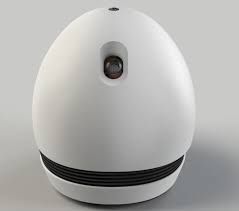Five CES Inventions That Are Better Than Science Fiction

In the early 1960s, the animated television show "The Jetsons" gave viewers a glimpse into the future. Personal robots, video phone calls and folding cars were all part of the shiny, imaginary world. Fast-forward to the 2014 International Consumer Electronics Show (CES) in Las Vegas, and the future is now.
Here are five innovations introduced at last week's show that are bringing "imaginary" technology to life:
The Keecker
In every "Star Wars" film, the R2D2 droid usually ends up saving the gang using myriad talents. But one of his most important jobs was saving and showing a very important hologram message. The Keecker may not be transmitting distress calls, but it can be just as useful.
At the CES, former Google product manager Pierre Lebeau introduced the robot that scoots around behind its owner, waiting to project video onto any surface after mapping the house layout.
This little helper will cost between $4,000 and $5,000 when it launches at the end of the year, but if you’re into smart home entertainment, this could be just the droid you’re looking for.
The Withings Smart Body Analyzer
Star Trek’s Dr. Leonard McCoy is able to do a quick scan of any crewmember to learn their vital stats and make a quick analysis. Of course, he’s a doctor, not a gadget, but the Withings Smart Body Analyzer technology is pretty similar.
The device looks like an ordinary scale, but its sensors measure and track body fat, heart rate and even air quality as well as weight. Then, it sends the data to a smartphone. Users get regular status updates and can pursue fitness goals accordingly.
For the price of $149.95, users can have something that can do almost as much as McCoy -- though hopefully without the snarky comments.
This wasn’t the only health and fitness monitor at the show. There were also accessories that sense ultraviolet rays and wireless blood pressure and glucose monitors.
Samsung Electronics Co. Ltd. (SE:005930) Chef Collection Refrigerator
In "2001: A Space Odyssey," Dr. Dave Bowman lives and works on a fully automated ship that knows what he wants with just a few commands.
Though he would probably never ask “Hal” to open the dual-fridge doors, Samsung’s Chef Collection refrigerator is one of many appliances bringing consumers closer to a space-age home.
The “smart” fridge, which costs around $6,000, features an LED display on the outside that vanishes when not in use. Another Samsung model has a screen for Twitter (NYSE:TWTR) and other social media. And that's not all. There are further plans for software that lets owners text their appliances and warns them when food will go bad.
Audi’s (GR:NSU) Self-Driving Car
In the original 1990 "Total Recall", Arnold Schwarzenegger’s character, Doug Quaid, lives in a dystopian future where memories are manufactured and “Johnny Cabs” drive themselves – complete with robot drivers.
Most people are probably happy that memory implants aren’t real, and the Audi A7 automated is probably much more fun.
The car can recognize signs, lane markings and pedestrians using a combination of GPS, cameras and sensors. BMW (GR:BMW) also launched a similar vehicle. The technology still needs some development, but the $70,000 price tag is far from imaginary.
The ChefJet
In "Back to the Future II," Marty’s future kitchen is equipped with a food hydrator that can zap up a pizza dinner for the whole family in seconds.
Though microwaves are pretty close, nothing is as fast or as colorful as the ChefJet – a home 3D printer that creates chocolate and sugary desserts in minutes on demand after designs are bought online.
When it is released in a few months, the ChefJet will cost just under $5,000. Its manufacturer, 3D Systems Corporation (NYSE:DDD), also makes the CubeJet and CeraJet for printing plastic and ceramic objects.
© Copyright IBTimes 2025. All rights reserved.





















